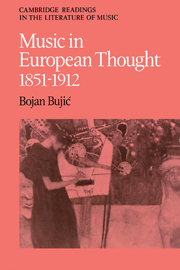Book contents
- Frontmatter
- Contents
- Preface
- Acknowledgments
- List of abbreviations
- General introduction
- Part I German aesthetics of music in the second half of the nineteenth century
- Part 2 Aesthetics of music in France and England
- Part 3 Music and positivist thought
- Part 4 Bridge between music theory and philosophy and the beginnings of musicology as an independent discipline
- Part 5 New tendencies at the turn of the century
- Select bibliography
- Index
Part I - German aesthetics of music in the second half of the nineteenth century
Published online by Cambridge University Press: 05 February 2012
- Frontmatter
- Contents
- Preface
- Acknowledgments
- List of abbreviations
- General introduction
- Part I German aesthetics of music in the second half of the nineteenth century
- Part 2 Aesthetics of music in France and England
- Part 3 Music and positivist thought
- Part 4 Bridge between music theory and philosophy and the beginnings of musicology as an independent discipline
- Part 5 New tendencies at the turn of the century
- Select bibliography
- Index
Summary
Music as an autonomous being
Introduction
In his anthology of texts dealing with the aesthetics of music entitled Musik-Ästhetik in ihren Hauptrichtungen, Felix Gatz introduced a firm division of aesthetic writings into two groups according to the basic criterion of whether an author believes that music does or does not possess the power to express the emotions. Such a rigid division is unadvisable as a system, but the two groups may be cautiously accepted as a scheme which could help to organize an anthology.
As all rigid divisions, the grouping of philosophical theories into two opposing camps of the aesthetics of content and the aesthetics of form does not reckon with the possibility of a considered critical approach beyond the boundaries of dogmatism. Yet, and in a seeming contradiction with the caveat expressed above, division into groups is not only useful but seems to stem from the nature of the speculation. Music seemed to have allowed even the ancient Greek philosophers only two possible paths of approach. One was taken by all those who, following Plato and Aristotle, saw in music a vehicle for the transmission of an ethical content, and the other who, like the Epicureans and particularly Philodem of Gadara assumed a sceptical position. In the early phase of German classical philosophy Kant, without reviewing the implications of the ancient division, and given the fundamental aim of his evaluation of art forms, recognized the poor use of music in a system which is founded on the premiss that the arts have a cognitive role.
- Type
- Chapter
- Information
- Music in European Thought 1851–1912 , pp. 5 - 176Publisher: Cambridge University PressPrint publication year: 1988



